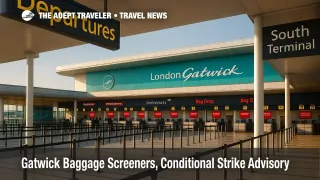Gatwick baggage screeners, conditional strike advisory

Unite confirmed that the August 22 to 26 walkout by Gatwick's ICTS baggage screening staff was suspended to ballot an improved pay offer. If members reject the deal, a second strike window from August 29 to September 2 could proceed, affecting check-in, hold-bag screening, and baggage delivery at London Gatwick Airport (LGW). Travelers should build extra time into departures, travel with essentials in carry-ons, and watch for airline day-of adjustments.
Key Points
- Why it matters: A Gatwick baggage screeners strike could slow check-in and hold-bag screening across terminals.
- Travel impact: Expect longer bag-drop lines, possible late baggage loading, and slower arrivals reclaim.
- What's next: Unite will ballot members on the offer. If rejected, action runs August 29 to September 2.
- Check cutoffs, then add 60 to 90 minutes to your normal airport buffer.
- UK261 compensation usually does not apply to third-party airport strikes.
Snapshot
Unite says the August 22 to 26 action is suspended while ICTS staff vote on a new pay offer. The union has warned that, if the offer is rejected, strikes from August 29 to September 2 will go ahead. Because ICTS screeners support baggage screening across the airport, disruption would be airport-wide rather than tied to a single airline. Airlines intend to operate schedules, but travelers should expect longer queues at bag drop, intermittent delays moving checked bags to aircraft, and slower baggage reclaim. Follow your airline's published check-in, bag-drop, and gate deadlines, then add extra buffer time, especially for families, mobility needs, or morning peak departures.
Background
Unite announced late-August strike dates after a pay dispute with ICTS, which provides baggage screening services at Gatwick. On August 15, Unite said an improved offer prompted suspension of the first window, August 22 to 26, pending a ballot. The union states that, if members reject the offer, industrial action will proceed from August 29 to September 2. Gatwick's public guidance advises passengers to arrive at least two hours before departure as a general rule, with airline-specific check-in opening times typically four hours for long-haul, three hours for European, and two hours for UK and Ireland flights. During industrial action, additional time at bag drop and for baggage reclaim is prudent, since screening throughput constraints can ripple through aircraft loading and arrivals.
Latest Developments
Gatwick baggage screeners strike, what to expect if Aug 29 to Sep 2 proceeds
If the ballot fails and the strike goes ahead from August 29 to September 2, plan for slower hold-bag screening and irregular baggage flows. For departures, verify your airline's check-in and bag-drop cutoffs, then add 60 to 90 minutes beyond your usual buffer. As a rule of thumb, aim for 3.5 to 4 hours before long-haul, and 2.5 to 3 hours before European or UK flights, especially at morning peaks. Pack medications, documents, valuables, one change of clothes, and a day's essentials in your carry-on. For arrivals, expect extended waits at reclaim. If you have tight rail, coach, or cruise connections, book flexible tickets or later transfers. Airlines must still provide care and assistance for long delays, but compensation under UK261 generally does not apply when disruption is caused by airport or air traffic control staff strikes.
Analysis
A baggage screeners strike touches the most time-sensitive points in the departure flow, namely hold-bag acceptance and screening. Even if security lanes and airline staffing are normal, constrained screening of checked bags can back up bag-drop queues and slow aircraft loading, which cascades into delays. Unlike airline-specific disputes, screening impacts multiple carriers simultaneously, so recovery windows can shrink during peak waves. Gatwick's baseline guidance, including long-haul check-in opening four hours before departure and European opening three hours before, offers a framework for planning. The practical step for travelers is to treat those as the earliest viable targets, then add margin. For families or group travel, spreading weight across cabin bags and pre-printing tags where available can reduce time at the counter. On the rights side, UK261 compensation hinges on cause. Third-party airport strikes are usually considered extraordinary circumstances, so cash compensation is unlikely, though meals, hotels, or rerouting can still apply when delays exceed thresholds. The near-term variable is the ballot result. If accepted, disruption risk recedes. If rejected, the August 29 to September 2 window will pressure peak holiday flows.
Final Thoughts
Contingency planning is straightforward. Verify airline cutoffs, arrive earlier than usual, and keep essentials in your cabin bag in case checked luggage is delayed. Build slack into onward connections, and monitor airline alerts closely through departure day. Should the ballot fail and the walkout proceed, these steps will help you absorb the queues and reduce stress during the Gatwick baggage screeners strike.
Sources
- Gatwick ICTS baggage screening strikes suspended following improved pay offer, Unite the Union
- Gatwick braced for severe August delays as baggage screeners strike, Unite the Union
- Relief for holidaymakers as August Gatwick strike action suspended, Evening Standard
- Checking in, London Gatwick Airport
- Checking-in FAQs, London Gatwick Airport
- Am I entitled to compensation, UK Civil Aviation Authority
- Delays, UK Civil Aviation Authority
- London Gatwick Airport information, British Airways
